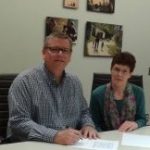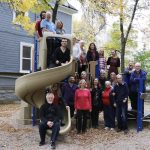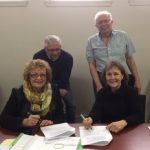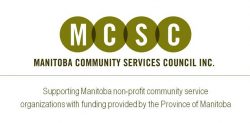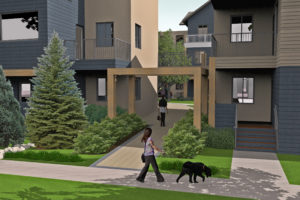In mid-June, 2020, the Canada Green Building Council advised OGHC that our development at 200 Arlington has been awarded LEED (Leadership in Energy and Environmental Design) Silver certification.
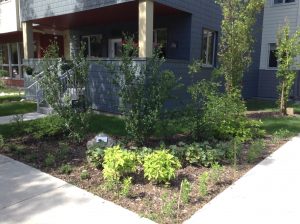
LEED is the world’s most widely used green building rating system. OGHC members decided to pursue LEED certification for the 200 Arlington project early in the design process. It was seen as a way of quantifying, enforcing, and verifying the membership’s commitment to environmental sustainability. Prairie Architects Inc., our architect, had extensive experience with green building practices and neighbourhood engagement, and played an important role in helping us gain this recognition.
Embracing green building practices is critical to improving environmental sustainability. As Prairie Architects noted:
Buildings are responsible for an enormous amount of global energy use and according to the 2018 Global Status Report, building construction and operations accounted for 36% of global final energy use and 40% of energy-related carbon dioxide (CO2) emissions in 2017.
Prairie Architects designed the first LEED building in Manitoba, the Mountain Equipment Co-op in downtown Winnipeg, and was also the architect for Greenheart Housing Co-op – the only other housing co-op in Canada to achieve LEED certification.
LEED buildings must meet certain prerequisites and are awarded points, to a maximum of 110, for other elements.
To receive Silver certification, a project has to conform to criteria related to:
- Site Selection and Maintenance
- Water Efficiency
- Energy and Atmosphere
- Materials and Resources
- Indoor Environmental Quality
- Innovation and Design Process
- Regional Priority
These categories touch upon almost every aspect of design, construction, and operation. Examples of ways in which OGHC is meeting these standards include:
- taking measures to control erosion during construction;
- developing a landscape design that makes effective use of rainwater;
- ensuring that the building is considerably more energy efficient than if it simply met the provisions of Canada’s Model National Energy Code for Building;
- installing water-conserving bathroom and kitchen fixtures;
- not using ozone-depleting substances in the building’s mechanical system;
- diverting three-quarters of what would normally be considered construction waste to different recycling facilities;
- using materials with recycled and regional content.
The LEED project profile can be found here.
While OGHC had targeted Gold level certification (Platinum is the highest level), we fell three points short of the Gold level. Our ability to reach that goal was limited by a number of factors, including the provincial government’s decision to knock down the previously existing building and clear the site. This limited our ability to use recycled construction material.
OGHC did not seek LEED certification for the townhouse construction, largely because the scale of the project and the funding available would not have warranted the related application expense. However, Prairie applied the same sustainability principles to the townhouse design and the townhouses received a PowerSmart for New Homes designation.
The Arlington building received the PowerSmart incentive for energy savings (a 27% better performance than the Manitoba Energy Code for Buildings) and both phases exceed the province’s Green Building Policy.
OGHC members and friends can be very proud of our demonstrable commitment to sustainability. We also benefit daily from having adopted LEED building practices. We are using less water and power than traditional residential buildings and paying lower utility bills. Our advanced heating, cooling, and ventilation system results in improved air quality in our suites and common areas. The high levels of insulation not only keep our suites cooler in summer and warmer in winter, they keep them quieter.
OGHC Building Committee Team: Victor Dobchuk, Laura Sevenhuysen, and Sandra Hardy.

